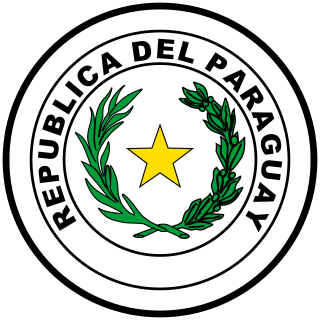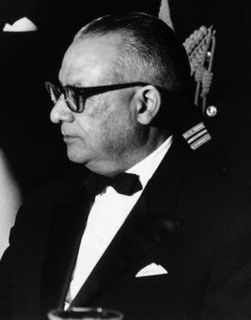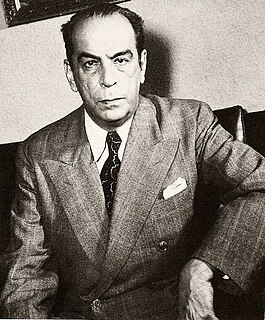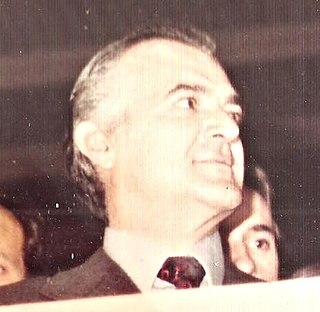The National Encounter Party is a political party in Paraguay.

General elections were held in Venezuela on 4 December 1988. The presidential elections were won by Carlos Andrés Pérez of Democratic Action, who received 52.9% of the vote, whilst his party won the most seats in the Chamber of Deputies and Senate. Voter turnout was 81.9% in the presidential election and 81.7% in the Congressional elections.

General elections were held in Mexico on July 6, 1988.

General elections were held in Venezuela on 1 December 1963. The presidential elections were won by Raúl Leoni of Democratic Action, who received 32.8% of the vote, whilst his party won 66 of the 179 seats in the Chamber of Deputies and 22 of the 47 seats in the Senate. Voter turnout was 92.3% in the presidential election and 90.8% in the Congressional elections.

General elections were held in Paraguay on 27 April 2003. The presidential elections were won by Nicanor Duarte of the Colorado Party, who received 38.3% of the vote. In the Congressional elections, the Colorado Party won 37 of the 80 seats in the Chamber of Deputies and 16 of the 45 seats in the Senate. Voter turnout was 64.3% in the presidential election, 64.2% in the Senate election and 64.1% in the Chamber of Deputies election.

General elections were held in Venezuela on 7 December 1958. The presidential elections were won by Rómulo Betancourt of Democratic Action, who received 49.2% of the vote, whilst his party won 73 of the 132 seats in the Chamber of Deputies and 32 of the 51 seats in the Senate. Voter turnout was 94.4% in the presidential election and 92.1% in the Congressional elections.

General elections were held in Mexico on 7 July 1946. The presidential elections were won by Miguel Alemán Valdés, who received 77.9% of the vote. In the Chamber of Deputies election, the Institutional Revolutionary Party won 141 of the 147 seats.

General elections were held in Mexico on 7 July 1952. The presidential elections were won by Adolfo Ruiz Cortines, who received 74.3% of the vote. In the Chamber of Deputies election, the Institutional Revolutionary Party won 151 of the 161 seats. These were the last presidential elections in Mexico in which women were not allowed to vote.

General elections were held in Mexico on 6 July 1958. The presidential elections were won by Adolfo López Mateos, who received 90.4% of the vote. In the Chamber of Deputies election, the Institutional Revolutionary Party won 153 of the 162 seats. These were the first Mexican presidential elections in which women were allowed to vote.

General elections were held in Mexico on 5 July 1964. The presidential elections were won by Gustavo Díaz Ordaz, who received 90.4% of the vote. In the Chamber of Deputies election, the Institutional Revolutionary Party won 175 of the 210 seats.

General elections were held in Mexico on 5 July 1970. The presidential elections were won by Luis Echeverría Álvarez, who received 86.0% of the vote. In the Chamber of Deputies election, the Institutional Revolutionary Party won 178 of the 213 seats, as well as winning all 64 seats in the Senate election. Voter turnout in the legislative elections was 64.4%.

General elections were held in Venezuela on 3 December 1978. The presidential elections were won by Luis Herrera Campins of Copei, who received 46.6% of the vote. Although Copei received more votes, Democratic Action won the most seats in the Venezuelan Chamber of Deputies, whilst the two parties won 21 seats each in the Venezuelan Senate. Voter turnout was 87.6%.

General elections were held in Venezuela on 14 December 1947. The presidential elections were won by Rómulo Gallegos of Democratic Action, who received 74.3% of the vote, the largest presidential win in Venezuela's modern history. His party won 83 of the 110 seats in the Chamber of Deputies and 38 of the 46 seats in the Senate.

General elections were held in Paraguay on 6 February 1983. Alfredo Stroessner of the Colorado Party won the presidential elections, whilst the Colorado Party won 20 of the 30 seats in the Senate and 40 of the 60 seats in the Chamber of Deputues. Voter turnout was 92.6%.

General elections were held in Cuba on 1 December 1905. Tomás Estrada Palma won the presidential election, whilst his Moderate Party won all twelve seats in the Senate and 31 of the 32 seats in the House of Representatives, winning 27 of the 63 seats. Voter turnout was 74.0%.

Parliamentary elections were held in Haiti on 30 April 1961. They followed the dissolution of Parliament by President François Duvalier and the abolition of the Senate, making the Chamber of Deputies a unicameral body. Duvalier's National Unity Party won all 67 seats in the elections, which were later re-interpreted as presidential elections in order to give Duvalier a six-year presidential term and avoid the need for scheduled presidential election in 1963.

General elections were held in Paraguay on 11 February 1973. Alfredo Stroessner of the Colorado Party won the presidential elections, whilst the Colorado Party won 20 of the 30 seats in the Senate and 40 of the 60 seats in the Chamber of Deputues. Voter turnout was 77.4%.

General elections were held in Paraguay on 9 May 1993. In the country's first honest election, as well as the first with no military candidates since 1928, Juan Carlos Wasmosy of the Colorado Party won the presidential election. The Colorado Party remained the largest party in the Chamber of Deputies and the Senate, albeit with only a plurality. The opposition Authentic Radical Liberal Party and National Encounter Party held a majority of the seats in both chambers, later supplemented by the Colorado Reconciliation Movement which broke away from the Colorado Party. Voter turnout was 69.0% in the presidential election, 67.6% in the Chamber elections and 69.4% in the Senate elections.
General elections were held in Bosnia and Herzegovina on 18 November 1990, with a second round of voting in the House of Peoples elections on 2 December. These were the final general elections to be held in Bosnia and Herzegovina while it was still a constituent republic of the Socialist Federal Republic of Yugoslavia.

General elections were held in Brazil on 3 October 1994. The presidential elections were won by Fernando Henrique Cardoso of the Brazilian Social Democracy Party, who received 54.3% of the vote. Cardoso won the election by a margin of 27.3%, the largest in Brazilian history to date, and the first of his two landslide victories. The Brazilian Democratic Movement Party remained the largest party in the Chamber of Deputies and the Senate.





















